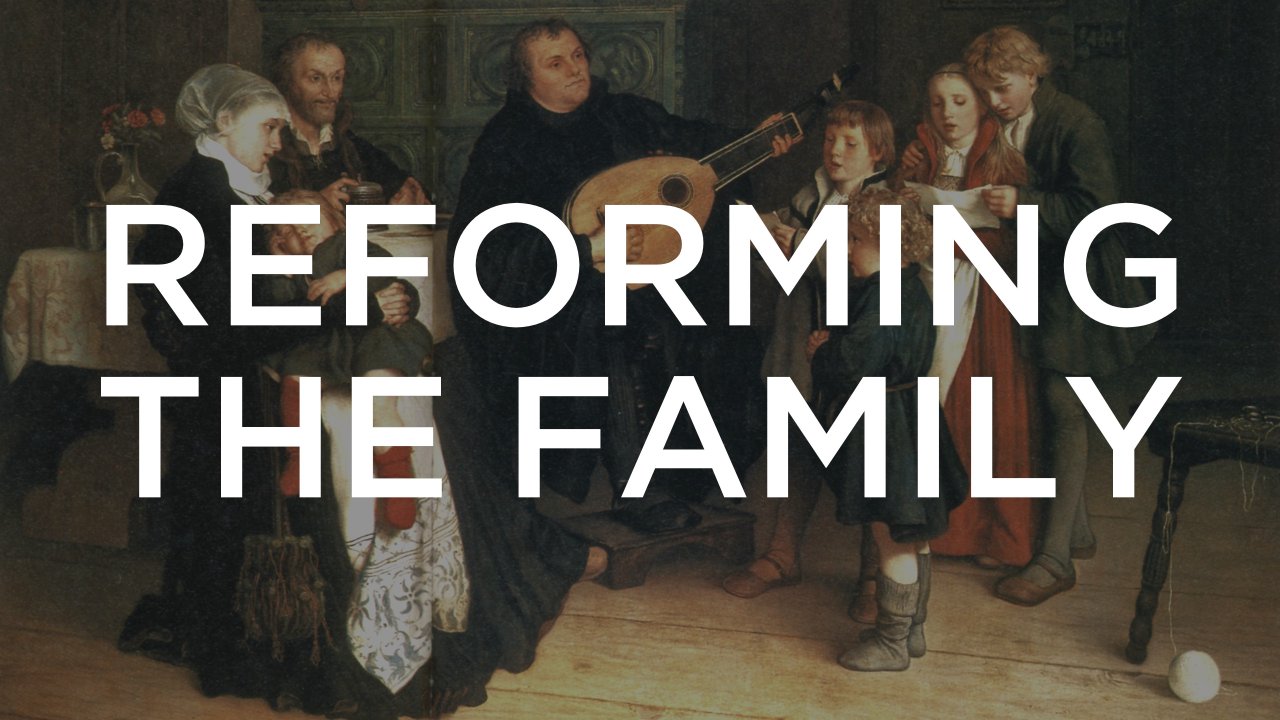INTRODUCTION
We understand that there is no such thing as a healthy Christian community without a large number of healthy Christian families. Just as you cannot have a good omelet without good eggs, so also it is impossible to have a cheerful town, or church, or community, when all the households are just little oases of misery.
THE TEXT
“Trust in the Lord, and do good; So shalt thou dwell in the land, and verily thou shalt be fed. Delight thyself also in the Lord; And he shall give thee the desires of thine heart. Commit thy way unto the Lord; Trust also in him; and he shall bring it to pass. And he shall bring forth thy righteousness as the light, and thy judgment as the noonday. Rest in the Lord, and wait patiently for him: Fret not thyself because of him who prospereth in his way, because of the man who bringeth wicked devices to pass. Cease from anger, and forsake wrath: Fret not thyself in any wise to do evil. For evildoers shall be cut off: But those that wait upon the Lord, they shall inherit the earth” (Psalm 37:3–9).
SUMMARY OF THE TEXT
At the beginning of our passage, we are told (simply) to trust God and to do good (v. 3). The consequence of this is that you will dwell in the land and you will be nourished (v. 3). When you delight in the Lord, your desires are thereby calibrated (v. 4). Not only are they calibrated, but they are also granted. This is why Augustine could say something like “love God and do as you please.” The future is a big unknown, and God is the only one who holds it in the palm of His hand. That is why we must commit our plans to Him (v. 5), and He will bring it to pass. He is the one who will make your righteousness and your judgment shine like the midday sun (v. 6). Rest in the Lord, and rest in His timeline (v. 7). The wicked can seem like they are getting ahead because of how they cut corners, pursuing a “quick growth” prosperity. Don’t get worked up about it (v. 8). This is because God will cut off the evildoers, and those who wait upon the Lord will be the ones who inherit the earth (v. 9).
CONFESSION IN THE FAMILY
When we tolerate or nurture unconfessed sin in our lives, this makes it impossible for us to delight in the Lord. When we are disobedient, God’s hand is on us for chastisement (Heb. 12:11; Ps. 32:4), and God does know how to spank. But if we walk in the light as He is the light, we have fellowship with one another (1 John 1:7). And in order to clear the way so that we can walk in the light, it is necessary for us to confess the ways we have walked in accord with darkness (1 John 1:8-10).
This is an illustration I use in my premarital counseling, and because I am not tired of using it, I am going to bring it in here. Imagine two houses, side by side. Five kids in each one, husbands work at the same company, they attend the same church, the wives are good friends, and they drive the same kind of van. The only difference you can see between the two homes is that one is immaculate and the other one is blitzed. But this difference is not created by how many breakfast bowls are used, or how many t-shirts are put on in the morning, or how many shoes are put on in the morning. That is all the same. The difference lies in when things are cleaned, picked up, and put away. That is where the difference is.
Now far too many conservative Christian evangelical households are (spiritually speaking) something like the closets at the crazy cat lady’s house.
COVENANT IN THE FAMILY
We live in the midst of covenant realities, and covenants are larger than the sum of their parts. Covenant realities are realities, which is another way of saying that your family is a thing in the world. It is not simply a “living arrangement.”
We as Christians are members of the new covenant, of course, as the prophet Jeremiah predicted (Jer. 31: 33ff). The Church is a covenant reality. But we are a covenant reality all the way down. Marriages are what they are by covenant. The faithless wife in Proverbs was faithless because she forgot the covenant of her God (Prov. 2:17). The faithless husbands in Malachi were faithless because they had dealt treacherously with the wives of their covenant (Mal. 2:14).
What is needed in many households is an understood structure for your obedience. Your family’s last name is a thing, a covenantal thing, an entity. And because it is an institution created by God, He is the one who writes the by-laws. He is the one who assigns the various offices, and He is one who gives us our respective duties.
FRUITFUL HONOR
Do you want to dwell in the land? Do you want to inherit the earth (Ps. 37:11)? What is the first commandment with a promise then? “Children, obey your parents in the Lord: for this is right. Honour thy father and mother; (which is the first commandment with promise;) That it may be well with thee, and thou mayest live long on the earth” (Eph. 6:1–3). This required honor takes two forms. The first is the obedience that children should render to their parents. The second is the financial support that grown children must render to their parents: “But ye say, If a man shall say to his father or mother, It is Corban, that is to say, a gift, by whatsoever thou mightest be profited by me; he shall be free. And ye suffer him no more to do ought for his father or his mother; Making the word of God of none effect through your tradition, which ye have delivered: and many such like things do ye” (Mark 7:11–13).
WHAT DOES IT MEAN TO CALL SOMETHING CHRISTIAN?
Christ is the Second Person of the Trinity, and is therefore omnipresent. He is everywhere present. But He is not present everywhere covenantally. And so what do we mean when we say something—like our household—is Christian? We should mean that Christ is present, and present covenantally.
“Repent ye therefore, and be converted, that your sins may be blotted out, when the times of refreshing shall come from the presence of the Lord” (Acts 3:19).
Is your home a Christian one? Have times of refreshing arrived there from the presence of the Lord?

Reforming the Family
November 21, 2021 • Douglas Wilson • Psalm 37:3–9
Our Gibbeted Christ (Good Friday)
March 29, 2024 • Douglas Wilson
This evening we have gathered to commemorate the crucifixion of our Lord Jesus Christ, the one who was sent into the world in order to die. And He was sent in order to die so that by that death, He might strike these chains off our wrists. In order to understand this, we have to come to grips with the fact that the death of Jesus was a vicarious, substitutionary death. He became the propitiation for our sins, as the Scripture repeatedly declares. All of this means that all the consequences of our rebellion—including fear, guilt, and shame—were poured out over Him. These burdens were laid across His shoulders so that He might die with them there, carry them all to the depths of Hades with Him, and then to come back from the dead without them. That is the message. That is why the death of Christ is such good news.
The Resurrection of the World
March 31, 2024 • Douglas Wilson • Romans 8:11, Romans 8:18–23
Two thousand years ago, a man who had been wickedly betrayed by the religious authorities, murderously crucified by the Roman civil authorities, did the unthinkable by rising from the dead. This was God’s plan from the beginning, and the Lord Jesus knew that this was the plan. “Therefore doth my Father love me, because I lay down my life, that I might take it again. No man taketh it from me, but I lay it down of myself. I have power to lay it down, and I have power to take it again. This commandment have I received of my Father” (John 10:17–18). And when Jesus took up His life again, He was taking up absolute dominion. A man who dies and comes back to life again in history is the Lord of history. And this has enormous ramifications.
Stand Still and See His Salvation (Palm Sunday 2024)
March 24, 2024 • Douglas Wilson • 2 Chronicles 20:17, Exodus 14:13
One of the things that happened in the medieval period was that the church calendar began to get cluttered up with numerous saints’ days and celebrations, like so many barnacles on the ark that was the church. There were many blessings that resulted from the great Reformation, and one of them was that the number of Christian holidays was pared down to what came to be known as the “five evangelical feast days.” All of them were geared to the life of Christ—Christmas, Good Friday, Easter, Ascension, and Pentecost. It is our practice here at Christ Church to have all of our celebrations of these days land on Sunday, with two exceptions. In addition to our 52 Lord’s Day celebrations, we also have a service on Christmas Eve, and one on Good Friday. On Palm Sunday, the week before Easter, we also have a sermon that is geared to that theme, and so here we are.




